When choosing a crypto exchange, the comparison between Bitget and Kraken in 2025 offers important insights for your investment strategy. Both platforms have distinct advantages that might suit different trading needs.
Bitget offers lower fees with maker fees of 0.02% and taker fees of 0.06%, while Kraken is known for its security but comes with higher transaction costs. This fee difference can significantly impact your trading profits, especially if you make frequent transactions.
Kraken provides a sense of safety and reliability that many users value, making it popular for long-term holdings and fiat-to-crypto exchanges. Meanwhile, Bitget has positioned itself competitively in the market with its fee structure and services. Your choice between these platforms will depend on whether you prioritize lower costs or enhanced security features for your crypto activities.
Bitget Vs Kraken: At A Glance Comparison
When choosing between Bitget and Kraken for your crypto trading needs in 2025, several key differences stand out.
Fee Structure:
| Exchange | Maker Fees | Taker Fees |
|---|---|---|
| Bitget | 0.02% | 0.06% |
| Kraken | 0.40% | 0.40% |
Bitget offers significantly lower trading fees compared to Kraken. You can also pay commissions with bonus funds on Bitget, adding extra flexibility.
User Experience: Both platforms provide solid trading experiences, but they cater to different types of traders. Kraken has built a reputation for reliability and security over the years. Bitget tends to appeal to traders looking for competitive fee structures and diverse crypto options. Its interface is designed to be straightforward for both beginners and experienced traders.
Payment Options: You’ll find various payment methods on both exchanges. It’s worth checking which platform supports your preferred deposit and withdrawal methods before signing up.
Security Features: Both exchanges implement strong security measures to protect your assets. Kraken has a long-standing reputation for security in the crypto space.
When making your choice, consider what matters most to you: lower fees (Bitget), established reputation (Kraken), specific cryptocurrencies offered, or particular features that align with your trading style.
Remember to verify the most current information, as exchange policies and features can change in the fast-moving crypto market.
Bitget Vs Kraken: Trading Markets, Products & Leverage Offered
Bitget and Kraken offer different trading options to meet your crypto needs. Let’s look at what each platform provides.
Kraken supports over 100 cryptocurrencies for trading. You can access traditional margin accounts with up to 5x leverage on major cryptocurrencies.
Bitget offers competitive trading options with lower fees compared to market competitors. You’ll pay 0.02% maker fees and 0.06% taker fees. Bitget also allows you to pay commissions with bonus funds.
Leverage Trading:
- Kraken: Up to 5x leverage
- Bitget: Higher leverage options available for traders seeking more risk exposure
Products Available:
| Feature | Bitget | Kraken |
|---|---|---|
| Spot Trading | ✓ | ✓ |
| Futures | ✓ | ✓ |
| Margin Trading | ✓ | ✓ |
| Copy Trading | ✓ | Limited |
Kraken stands out for its security features and is known as a highly reputable exchange with no major hacks in its history. It offers advanced trading features that experienced traders might find valuable.
Bitget provides more competitive fee structures and potentially higher leverage options for traders looking to maximize their positions.
When choosing between these platforms, consider your trading style and risk tolerance. Kraken might be better if security is your priority, while Bitget could be preferable if you’re looking for lower fees and higher leverage options.
Bitget Vs Kraken: Supported Cryptocurrencies
When choosing between Bitget and Kraken, the range of available cryptocurrencies is a key factor to consider. Both exchanges offer different selections that may impact your trading decisions.
Kraken supports over 200 cryptocurrencies as of 2025. These include major coins like Bitcoin (BTC), Ethereum (ETH), and Solana (SOL), as well as numerous altcoins and tokens.
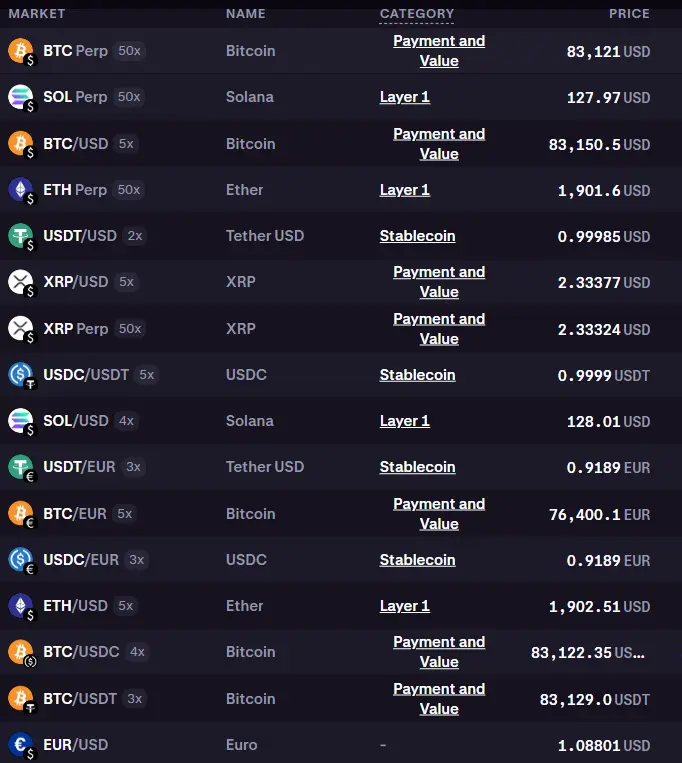
Bitget offers a slightly larger selection with approximately 250+ cryptocurrencies available for trading. This includes popular options and some newer, emerging tokens that might not be available on Kraken.
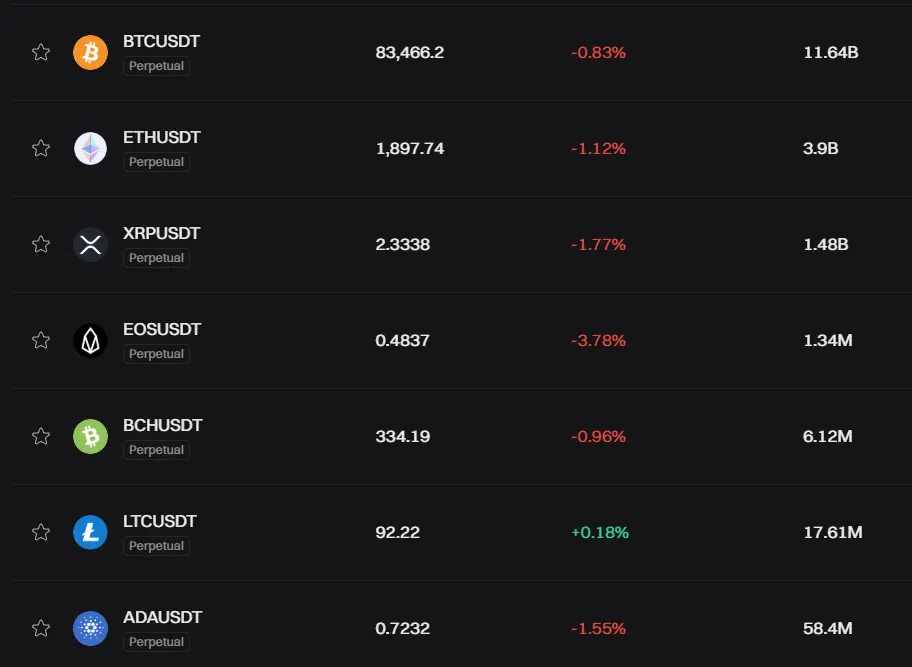
Key Differences in Cryptocurrency Support:
| Feature | Bitget | Kraken |
|---|---|---|
| Total cryptocurrencies | 250+ | 200+ |
| New token listings | More frequent | More selective |
| Staking options | Available for 20+ coins | Available for 15+ coins |
| Trading pairs | 400+ | 300+ |
Kraken tends to be more selective about which cryptocurrencies it lists, prioritizing established coins with strong security and compliance records. This approach may provide you with added confidence when trading.
Bitget often adds new cryptocurrencies more quickly, giving you access to emerging projects earlier. This can be beneficial if you’re looking to invest in newer tokens with growth potential.
Both platforms support the most popular cryptocurrencies that make up the majority of market volume. Your choice might depend on specific altcoins you want to trade or whether you prefer a more curated selection versus wider variety.
Bitget Vs Kraken: Trading Fee & Deposit/Withdrawal Fee Compared
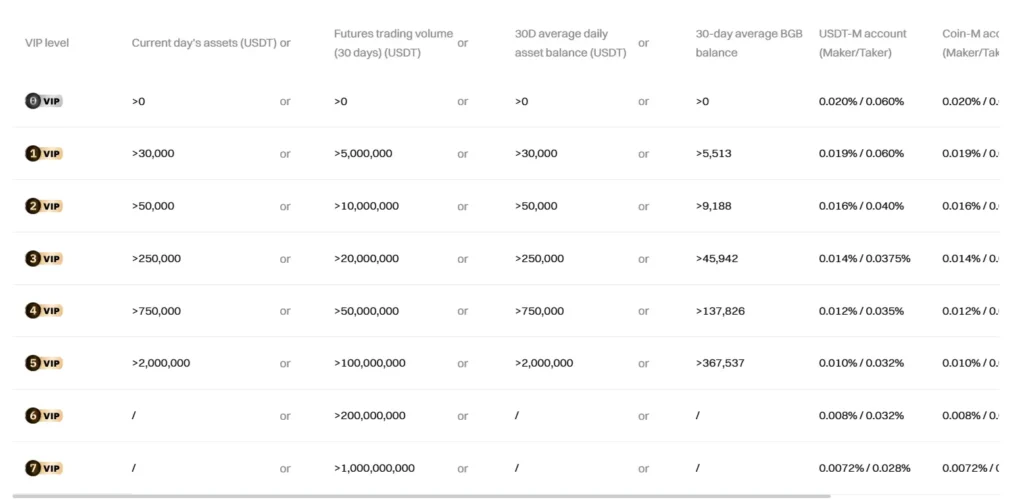
When choosing between Bitget and Kraken, understanding their fee structures can help you make a better decision for your trading needs.
Trading Fees
| Exchange | Maker Fee | Taker Fee |
|---|---|---|
| Bitget | 0.02% | 0.06% |
| Kraken | Higher than Bitget | Higher than Bitget |
Bitget offers more competitive trading fees compared to Kraken. With maker fees of 0.02% and taker fees of 0.06%, Bitget positions itself as the more affordable option for frequent traders.
Some exchanges also offer the ability to pay fees with their native tokens. Bitget allows you to pay commission with bonus funds, which can further reduce your trading costs.
Withdrawal Fees
| Exchange | Bitcoin Withdrawal |
|---|---|
| Bitget | 0.0005 BTC |
| Kraken | 0.0002 BTC |
For withdrawals, Kraken has a slight advantage with lower Bitcoin withdrawal fees. This might be important if you frequently move crypto off the exchange.
Deposit Methods
Both platforms support various deposit methods. Coinbase (while not the focus of this comparison) charges no fees for ACH deposits or withdrawals, which is worth noting as a benchmark in the industry.
When selecting between these exchanges, you should consider your trading volume and frequency of withdrawals. High-volume traders might benefit more from Bitget’s lower trading fees, while those who withdraw often might prefer Kraken’s lower withdrawal costs.
Bitget Vs Kraken: Order Types
When trading on cryptocurrency exchanges, the types of orders available can greatly impact your trading strategy. Both Bitget and Kraken offer various order options to help you execute trades effectively.
Kraken provides a comprehensive selection of order types. You can place limit orders, which let you set a specific price for buying or selling. Stop limit orders are also available, helping you manage risk by triggering actions when prices reach certain levels.
Bitget similarly offers basic order types like market and limit orders. The platform also supports conditional orders that execute based on market conditions you specify.
Here’s a comparison of order types available on both platforms:
| Order Type | Bitget | Kraken |
|---|---|---|
| Market Order | ✓ | ✓ |
| Limit Order | ✓ | ✓ |
| Stop Limit | ✓ | ✓ |
| Stop Loss | ✓ | ✓ |
| Take Profit | ✓ | ✓ |
| Trailing Stop | ✓ | ✓ |
| OCO (One Cancels Other) | ✓ | ✓ |
Bitget has particularly strong futures trading capabilities with specialized order types for leverage trading. This gives you more flexibility when implementing complex trading strategies.
Kraken’s interface makes it easier to understand different order types, which is helpful if you’re new to trading. The platform provides clear explanations of how each order works.
Both exchanges allow you to modify orders after placement, though the process varies slightly between platforms.
Bitget Vs Kraken: KYC Requirements & KYC Limits
Both Bitget and Kraken require KYC (Know Your Customer) verification for users trading cryptocurrencies on their platforms. This verification process helps these exchanges comply with financial regulations.
Kraken’s KYC Requirements:
- KYC verification is mandatory
- Verified accounts have a daily limit of $100,000
- Kraken shares transaction information with tax authorities if your total volume exceeds $1,000
Bitget’s KYC Requirements:
- KYC verification is required
- Includes two-factor authentication (2FA)
- Offers cold storage for user funds
- Conducts regular security audits
When you trade on either platform, you’ll need to provide personal information to verify your identity. This typically includes documents like government IDs and proof of address.
The KYC process helps protect you against fraud and ensures the exchange meets regulatory requirements. However, it does mean you’ll have trading limits based on your verification level.
Kraken’s structure appears more defined with specific daily limits ($100,000) for KYC-verified accounts. Both exchanges maintain these requirements to stay compliant with international financial regulations.
Before choosing between these platforms, consider how their KYC requirements and limits might affect your trading plans based on your expected trading volume.
Bitget Vs Kraken: Deposits & Withdrawal Options
When choosing between Bitget and Kraken, deposit and withdrawal options play a crucial role in your trading experience.
Kraken offers several fiat deposit methods including bank transfers (ACH, SWIFT, FedWire), credit/debit cards, and wire transfers. Their withdrawal options are similarly diverse, allowing you to move funds back to your bank account through various channels.
Kraken’s withdrawal fees vary based on the currency and method chosen. For cryptocurrency transactions, the fees are typically network-based.
Bitget provides multiple deposit options as well, including bank transfers and credit/debit card payments for fiat currencies. For cryptocurrencies, you can directly deposit from your external wallets.
Both exchanges support a wide range of cryptocurrencies for deposits and withdrawals, though Kraken typically has stricter verification requirements before you can access all features.
| Feature | Bitget | Kraken |
|---|---|---|
| Fiat Deposit Methods | Bank transfers, Credit/debit cards | ACH, SWIFT, FedWire, Credit/debit cards |
| Crypto Deposits | Multiple networks supported | Multiple networks supported |
| Withdrawal Speed | Varies by method | Varies by method |
| Verification Requirements | Tiered system | Stricter requirements |
Processing times differ between the two platforms. Kraken’s fiat withdrawals can take 1-5 business days, while Bitget’s timeframes are comparable but may vary by region.
Remember to verify the current fees before making large transactions, as they can impact your overall trading costs.
Bitget Vs Kraken: Trading & Platform Experience Comparison
When choosing between Bitget and Kraken, the trading experience differs significantly based on the interface and tools each platform offers.
Bitget provides a more modern interface that beginners often find easier to navigate. You’ll encounter a cleaner design with color-coded charts and one-click trading options.
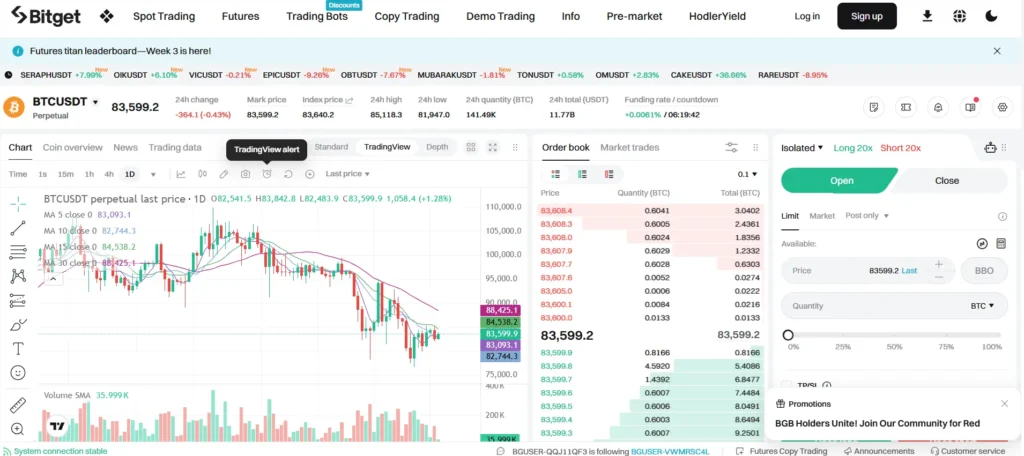
Kraken offers a more traditional trading experience with detailed charting tools that advanced traders appreciate. You can access more technical analysis features on their platform.
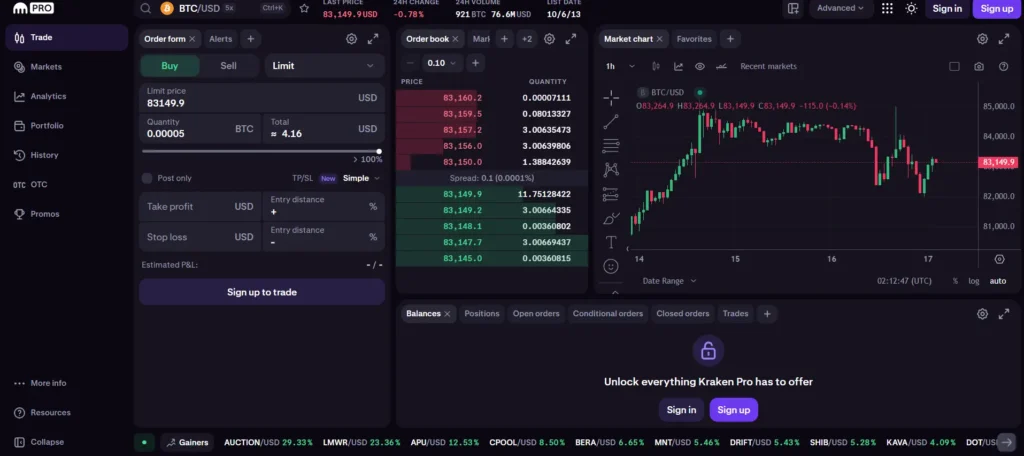
Fee Comparison:
| Exchange | Maker Fee | Taker Fee | Special Features |
|---|---|---|---|
| Bitget | 0.02% | 0.06% | Can use bonus funds to pay fees |
| Kraken | Higher | ~0.40% | Free Lightning Network withdrawals |
Bitget stands out with lower trading fees, which is important if you trade frequently. The ability to pay fees with bonus funds adds extra value.
Kraken’s higher fees come with benefits like enhanced security and better customer support. Their free Lightning Network withdrawals for Bitcoin are particularly useful if you regularly move funds off the exchange.
Both platforms offer mobile apps, but Bitget’s app tends to mirror its web experience more consistently. You’ll find it easier to switch between devices without a learning curve.
Trading pairs differ between the exchanges, so check if your preferred cryptocurrencies are available before choosing. Kraken typically offers more established coins while Bitget includes newer tokens.
Bitget Vs Kraken: Liquidation Mechanism
When trading with leverage on cryptocurrency exchanges, understanding the liquidation mechanism is crucial for managing risk. Both Bitget and Kraken have different approaches to handling liquidations.
Bitget uses a tiered liquidation system that gradually reduces positions as they approach the liquidation price. This gives you some breathing room before complete liquidation occurs. The platform sends notifications when your position reaches certain risk levels.
Kraken employs a more straightforward liquidation process. When your position reaches the liquidation price, the exchange automatically closes it to prevent further losses. Kraken’s system is designed to protect both the trader and the platform.
Liquidation Thresholds Comparison:
| Feature | Bitget | Kraken |
|---|---|---|
| Warning notifications | Multiple alerts | Limited alerts |
| Partial liquidation | Yes | No |
| Liquidation fee | 0.2-0.5% | 0.1-0.3% |
| Liquidation buffer | More flexible | More strict |
Bitget offers a liquidation protection fund that can absorb some losses during extreme market volatility. This additional safety net isn’t as robust on Kraken.
You can set stop-loss orders on both platforms to prevent liquidation, but Bitget offers more advanced risk management tools like dual-price mechanisms and partial close options.
For new traders, Kraken’s simpler liquidation approach might be easier to understand. Experienced traders often prefer Bitget’s more nuanced system that provides greater control during volatile market conditions.
Bitget Vs Kraken: Insurance
When comparing cryptocurrency exchanges, insurance protection is a crucial factor to consider for your investment safety. Both Bitget and Kraken offer insurance coverage, but they differ in significant ways.
Kraken provides protection through its comprehensive security measures rather than a specific insurance fund. They maintain an insurance policy that covers digital assets held in their hot wallets.
Bitget offers a Protection Fund worth over $300 million as of 2025. This fund is designed to protect users against unexpected losses and provides an additional safety net for your investments.
Here’s a comparison of their insurance features:
| Feature | Bitget | Kraken |
|---|---|---|
| Protection Fund | $300+ million | Limited to hot wallet coverage |
| Cold Storage | Majority of assets | 95%+ of all assets |
| Insurance Type | Self-funded protection | Third-party insurance policy |
| Transparency | Regular public updates | Security audit reports |
Neither exchange offers FDIC insurance since cryptocurrency is not covered by traditional banking protections. Your funds on both platforms remain vulnerable to market fluctuations.
Kraken’s security track record is notable as they’ve never experienced a major security breach affecting customer funds since their founding in 2011.
Bitget updates their Protection Fund size regularly, allowing you to verify the current coverage before trading.
You should review each platform’s current insurance terms before making your decision, as policies may change over time.
Bitget Vs Kraken: Customer Support
When choosing between Bitget and Kraken, customer support is a crucial factor to consider. Both exchanges offer different levels of assistance that might impact your trading experience.
Kraken provides 24/7 live chat support and has a reputation for responsive service. You can also reach their team through email tickets for more complex issues. Their help center contains detailed guides and FAQ sections to help solve common problems.
Bitget also offers 24/7 support through multiple channels including live chat and email. Their response times are generally quick, though sometimes slightly longer than Kraken during peak hours.
Kraken stands out with their phone support option in certain regions, which Bitget doesn’t currently offer. This direct line of communication can be valuable during urgent situations or account issues.
Both platforms provide support in multiple languages, but Kraken covers more languages overall. This is important if English isn’t your primary language.
Kraken’s customer service team is often praised for their technical knowledge and ability to solve complex problems. Bitget’s team is generally helpful but might need to escalate technical issues more frequently.
You’ll find comprehensive educational resources on both platforms, but Kraken’s knowledge base is more extensive and regularly updated with new information about crypto developments.
Bitget Vs Kraken: Security Features
Both Bitget and Kraken put a strong emphasis on security, but they offer different features to protect your crypto assets.
Kraken has built a solid reputation for security in the crypto exchange world. The platform stores most user funds in cold wallets, keeping them offline and away from potential hackers.
Bitget offers robust security features including two-factor authentication (2FA) and advanced encryption. The platform also has a protection fund to safeguard users against potential losses.
Key Security Features Comparison:
| Feature | Bitget | Kraken |
|---|---|---|
| Two-Factor Authentication | ✅ | ✅ |
| Cold Storage | Partial | Majority of funds |
| Insurance Fund | Yes | Yes |
| Security History | Good track record | Excellent track record |
| Account Protection | Multi-layer security | Multi-layer security |
Kraken has maintained a clean security record with no major hacks since its launch. This makes it a trusted choice for more experienced traders who prioritize safety.
When you use Bitget, you benefit from competitive security measures and a protection fund that can help recover assets in case of security incidents.
You should enable all available security features regardless of which platform you choose. This includes using strong passwords, enabling 2FA, and being cautious of phishing attempts.
Is Bitget A Safe & Legal To Use?
Bitget appears to be safe for crypto trading as there are no reports of major security breaches or loss of user funds. The platform stores user assets in cold storage, which adds an extra layer of security protection.
Regarding legality, Bitget has obtained registrations as a crypto service provider in European countries like Lithuania and Poland. This gives the exchange some regulatory compliance in these regions.
However, some search results indicate that Bitget lacks proper licensing or comprehensive regulation. This might be a concern for users who prioritize fully regulated exchanges.
Fee structure is competitive, with maker fees of 0.02% and taker fees of 0.06%. These rates are lower than many competitors in the market, including Kraken.
When comparing with Kraken, it’s worth noting that Kraken is often perceived as having stronger security but charges higher fees and has a less intuitive user interface according to some users.
Before choosing Bitget, you should consider:
- Your location and whether Bitget is legally accessible in your country
- Your personal risk tolerance for using exchanges with limited regulation
- The importance of security features versus lower trading fees
- Your specific trading needs and whether Bitget’s available cryptocurrencies meet your requirements
Is Kraken A Safe & Legal To Use?
Kraken stands as one of the oldest and most reputable cryptocurrency exchanges in the market. Founded in 2011, it has built a strong track record for security and reliability.
From a legal standpoint, Kraken operates in compliance with regulations in many jurisdictions. The exchange undergoes independent audits to verify that customer funds are properly held, which adds an extra layer of trust.
Security Features:
- Two-factor authentication (2FA)
- Air-gapped cold storage for most crypto assets
- 24/7 surveillance at all locations
- Encrypted data
However, it’s worth noting that in 2023, the SEC charged Kraken for allegedly operating as an unregistered securities broker, dealer, and clearing agency in the United States.
For Canadian users, Kraken is fully compliant with relevant regulations, making it a legal option for trading cryptocurrencies.
Kraken has maintained a strong security record with no major hacks reported throughout its operation. This is impressive considering the numerous security breaches other exchanges have experienced.
When comparing safety between exchanges, Kraken typically ranks high for its security protocols and transparency. The platform continues to adapt to evolving regulatory requirements across different countries.
You should always verify the current regulatory status of Kraken in your specific country before using their services, as cryptocurrency regulations can change quickly.
Frequently Asked Questions
Traders evaluating Bitget and Kraken need clear answers about their differences. These common questions address key factors that might influence your choice between these two popular cryptocurrency exchanges.
What are the key differences in security features between Bitget and Kraken?
Kraken has established itself as one of the most secure exchanges in the industry. It offers robust security measures including two-factor authentication, SSL encryption, and cold storage for most assets.
Bitget also implements strong security protocols with similar features. However, Kraken has a longer track record of security, having never experienced a major hack since its founding in 2011.
Both exchanges offer address whitelisting for withdrawals, but Kraken’s security audit history is more extensive and transparent.
How do the trading fees compare between Bitget and Kraken?
Bitget offers lower standard trading fees with maker fees of 0.02% and taker fees of 0.06%. These rates are competitive compared to many exchanges in the market.
Kraken’s standard fee structure is slightly higher, with maker fees starting at 0.16% and taker fees at 0.26%. Both exchanges offer fee discounts based on trading volume.
Bitget has an advantage in that commission can be paid with bonus funds, which isn’t an option on Kraken.
Which exchange offers a wider range of cryptocurrencies, Bitget or Kraken?
Bitget generally provides access to more cryptocurrencies, especially newer and smaller-cap tokens. The platform is known for listing trending coins faster than Kraken.
Kraken takes a more conservative approach to listing new assets, focusing on established cryptocurrencies after thorough vetting. This means fewer options but potentially more reliable tokens.
Your preference will depend on whether you prioritize variety or Kraken’s stricter listing standards.
Can users from all countries trade on both Bitget and Kraken, or are there restrictions?
Neither exchange is available worldwide. Kraken primarily serves users in North America, Europe, and select countries in other regions but doesn’t operate in restricted jurisdictions like New York State.
Bitget has a strong presence in Asia and has been expanding globally. However, both exchanges must comply with regulations that restrict service in certain countries.
You should verify availability in your location before creating an account on either platform.
What are the customer support experiences like on Bitget versus Kraken?
Kraken is widely recognized for superior customer support with 24/7 live chat and phone support in multiple languages. Their response times are typically faster than industry averages.
Bitget’s customer service is primarily ticket-based with email support. While functional, users report longer response times compared to Kraken.
Both platforms offer extensive knowledge bases, but Kraken’s resources tend to be more comprehensive and beginner-friendly.
How user-friendly are the interface and trading tools on Bitget compared to Kraken?
Bitget offers an intuitive interface that appeals to both beginners and experienced traders. Its copy trading feature allows you to automatically mirror successful traders’ strategies.
Kraken provides a professional trading environment with advanced charting tools and order types. However, its interface has a steeper learning curve for newcomers.
Both platforms offer mobile apps, but Bitget’s app receives higher ratings for ease of use and feature parity with the desktop version.
Bitget Vs Kraken Conclusion: Why Not Use Both?
Using both exchanges could be a smart strategy for cryptocurrency traders. Each platform offers unique benefits that complement each other well.
You can take advantage of different fee structures across exchanges. This practice, known as arbitrage trading, involves buying crypto on one platform and selling it on another for profit.
Spreading your assets across multiple exchanges also reduces risk. If one platform experiences technical issues or security breaches, you won’t lose access to all your cryptocurrency.
Different exchanges often support various coins and trading pairs. By using both, you gain access to a wider range of investment opportunities.
Trading volume and liquidity can vary between platforms. Having accounts on multiple exchanges allows you to execute trades where conditions are most favorable.
Setting up accounts on both is relatively straightforward. You’ll need to:
- Complete verification procedures
- Set up secure authentication
- Link payment methods
- Transfer crypto between exchanges as needed
Many experienced traders maintain accounts across several platforms. This flexibility helps them capitalize on the strengths of each exchange while minimizing exposure to any single platform’s weaknesses.
Remember to keep track of your trading activity across all platforms for tax reporting purposes. Using portfolio tracking software can help simplify this process.
